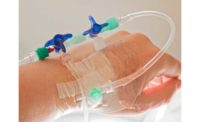A web-based survey conducted by the National Institute for Occupational Safety and Health (NIOSH) found that a perceived management commitment to safety was linked to a better use of personal protective equipment (PPE) and engineering controls to reduce the likelihood of health care professionals experiencing spills, leaks or skin contact during the administration of liquid antineoplastic drugs (AD).
ADs, also known as chemotherapy, cytotoxic and oncology drugs, are used to treat cancer, as well as arthritis, multiple sclerosis, and other non-cancer medical conditions.
This study is published in the July issue of the Journal of Occupational and Environmental Hygiene.
Who was included
Results are derived from the 2011 Health and Safety Practices Survey of Healthcare Workers, the largest federally-sponsored survey of U.S. healthcare workers that addresses safety and health practices around hazardous drugs and other chemicals. Members of professional practice organizations representing oncology nurses, infusion nurses, and hematology/oncology nurses were invited to participate in the survey, along with other healthcare professionals. Survey responses were analyzed from 1,814 nurses who had administered liquid AD in the seven days prior to the survey and whose employer was either a hospital or an ambulatory healthcare center.
The findings
Specific findings of the survey included the following:
- Approximately 14% of nurses reported experiencing an adverse event (spills/leak or skin contact) during the previous week.
- Use of engineering controls and PPE was better in non-profit and government vs for-profit settings, when workers were more familiar with safe handling guidelines, when specific safe handling procedures were present, and when perceived management commitment to safety was higher.
- Familiarity with safe handling guidelines and training in safe handling practices were associated with consistent use of more PPE items.
- Adverse events were associated with increased number of AD treatments and AD administration on more days of the week.
- Not experiencing an adverse event was associated with consistent use of more engineering controls and PPE, with more precautionary measures being in place, and with greater management commitment to safety and general risk perception.
Perceptions matter
Although not generalizable to all nurses who administer AD, the results of this survey show that safety climate perceptions, particularly those where management commitment to safety was higher: (1) contribute to the use of engineering controls and PPE, and (2) reduce spills/leaks and skin contact to ADs above and beyond pertinent organizational practices specific to safe handling of AD. The results also point to the value of implementing a comprehensive health and safety program that utilizes available hazard controls and effectively communicates the importance of safe handling practices, and such actions also contribute to creating a positive safety climate.
To access the paper online, visit: http://www.tandfonline.com/doi/full/10.1080/15459624.2017.1285496.
To learn about other findings from the Health and Safety Practices Survey of Healthcare Workers, visit: https://www.cdc.gov/niosh/topics/healthcarehsps/aboutstudy.html. For information on healthcare worker safety and health, visit: http://www.cdc.gov/niosh/topics/healthcare/.
NIOSH is the federal institute that conducts research and makes recommendations for preventing work-related injuries, illnesses and deaths. More information about NIOSH can be found at http://www.cdc.gov/niosh/

